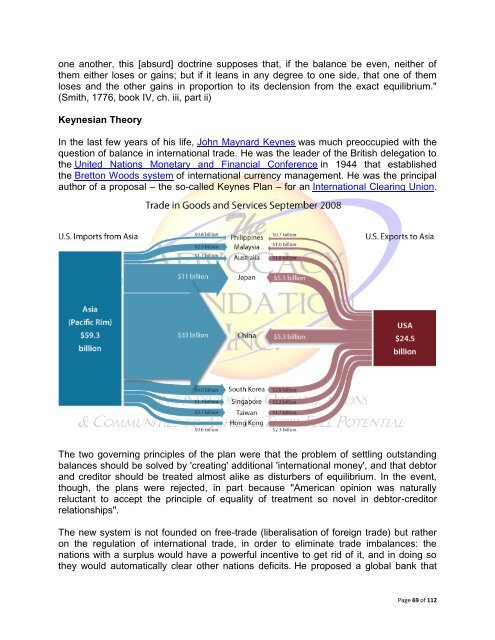De-Industrialization
De-Industrialization
De-Industrialization
Create successful ePaper yourself
Turn your PDF publications into a flip-book with our unique Google optimized e-Paper software.
one another, this [absurd] doctrine supposes that, if the balance be even, neither of<br />
them either loses or gains; but if it leans in any degree to one side, that one of them<br />
loses and the other gains in proportion to its declension from the exact equilibrium."<br />
(Smith, 1776, book IV, ch. iii, part ii)<br />
Keynesian Theory<br />
In the last few years of his life, John Maynard Keynes was much preoccupied with the<br />
question of balance in international trade. He was the leader of the British delegation to<br />
the United Nations Monetary and Financial Conference in 1944 that established<br />
the Bretton Woods system of international currency management. He was the principal<br />
author of a proposal – the so-called Keynes Plan – for an International Clearing Union.<br />
The two governing principles of the plan were that the problem of settling outstanding<br />
balances should be solved by 'creating' additional 'international money', and that debtor<br />
and creditor should be treated almost alike as disturbers of equilibrium. In the event,<br />
though, the plans were rejected, in part because "American opinion was naturally<br />
reluctant to accept the principle of equality of treatment so novel in debtor-creditor<br />
relationships".<br />
The new system is not founded on free-trade (liberalisation of foreign trade) but rather<br />
on the regulation of international trade, in order to eliminate trade imbalances: the<br />
nations with a surplus would have a powerful incentive to get rid of it, and in doing so<br />
they would automatically clear other nations deficits. He proposed a global bank that<br />
Page 69 of 112

















